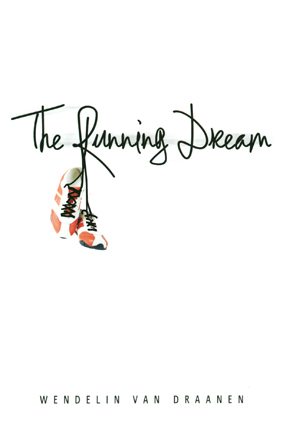Full Text Reviews: Booklist - 01/01/2011 Sixteen-year-old Jessica is the track team’s star sprinter until tragedy strikes: the team van is struck, killing one runner and demolishing Jessica’s right leg. The book begins with Jessica refusing to acknowledge the result: a stump. But she is slowly reintroduced to life, which involves being fitted for a prosthesis, returning to school, and dealing with the usual—tough teachers, mean girls, and one really hot, sensitive, supportive boy. It’s a classic problem novel in a lot of ways; accordingly, Van Draanen inserts setbacks with narrative precision, the most affecting of which (surprisingly) is the insurance battle that Jessica’s parents face. Overall, though, this is a tremendously upbeat book, with Jessica’s family, friends, and community coming together (the track team raises funds to buy Jessica a $20,000 running leg). Even a subplot involving Jessica’s friendship with the cerebral palsy–afflicted Rosa is not as treacly as it could have been. Van Draanen’s extensive research into both running and amputees pays dividends—readers will truly feel what it’s like to walk (or run) a mile (or 10) in Jessica’s shoes. - Copyright 2011 Booklist. Bulletin for the Center... - 02/01/2011 Running is Jessica’s life-or at least it is until the high-school junior loses her leg in a school-bus crash. Initially she’s struggling just to walk, resentfully learning self-care, and awkwardly negotiating her return to school, but she’s cheered by support from her old track-team buddies and coach and by a new friend, Rosa. She’s stunned, though, when she discovers that her team has embarked on a fund-raising effort to buy her a new prosthesis-one that will allow Jessica to return to the track as an athlete, not just an onlooker. Basically a modern version of the good old disability drama, the story capably follows Jessica through various stages of loss and adjustment, including an eventual romance (which Jessica initially considers impossible) with the mayor’s hunky son. Jessica’s emotional trajectory is pretty straightforward, with little complication or bittersweet nuance, but it’s solidly depicted, generally steering away from inspirational schmaltz in favor of realistic information. The book does offer unusual frankness in its address of the high cost of rehab and support after such an injury (there are legal battles going on to see whose insurance will cover the expenses); Jessica’s friendship with Rosa, whom she’d previously overlooked due to Rosa’s cerebral palsy, adds some complexity to the issue of disabled identity. The increasing visibility of disabled athletes makes this a subject of particular interest, and readers who are looking to delve into something more up to date than Voigt’s Izzy, Willy-Nilly (BCCB 5/86) will find Jessica’s story enlightening. DS - Copyright 2011 The Board of Trustees of the University of Illinois. School Library Journal - 02/01/2011 Gr 7 Up—Jessica has run her personal best at a track meet—then there's a tragic bus accident and the high school junior loses her leg as well as her future dreams. From waking up in the hospital and coping with the trauma, to her return home, then school, she tries to grab her life back. On one level the story offers inspiration to those dealing with physical changes in their own lives and the stages of recovery, fight, survival, and victory as Jessica reaches deep to push past her wall of self-pity and loathing, and moves beyond the "finish line." On a deeper level, there is her blind discrimination toward a fellow classmate who has cerebral palsy. Rosa is hard to understand and easy to ignore. She is anchored to a wheelchair. Jessica, encumbered by her crutches and her tender "stump," is seated in the back of the class, out of the way, next to Rosa. She learns that the girl is smart, wise, and friendly. They pass notes and share lunch. Rosa writes, "I wish people would see me and not my condition." When Jessica is running again—on a specially engineered prosthesis—she challenges herself to help her friend be seen. How Jessica orchestrates putting Rosa in the forefront of a community race and pushing her wheelchair across a finish line is a study in faith and determination. Readers will cheer for Jessica's recovery and be reminded to recognize people for their strengths and not overlook them because of their disabilities.—Alison Follos, North Country School, Lake Placid, NY - Copyright 2011 Publishers Weekly, Library Journal and/or School Library Journal used with permission. Loading...
|



